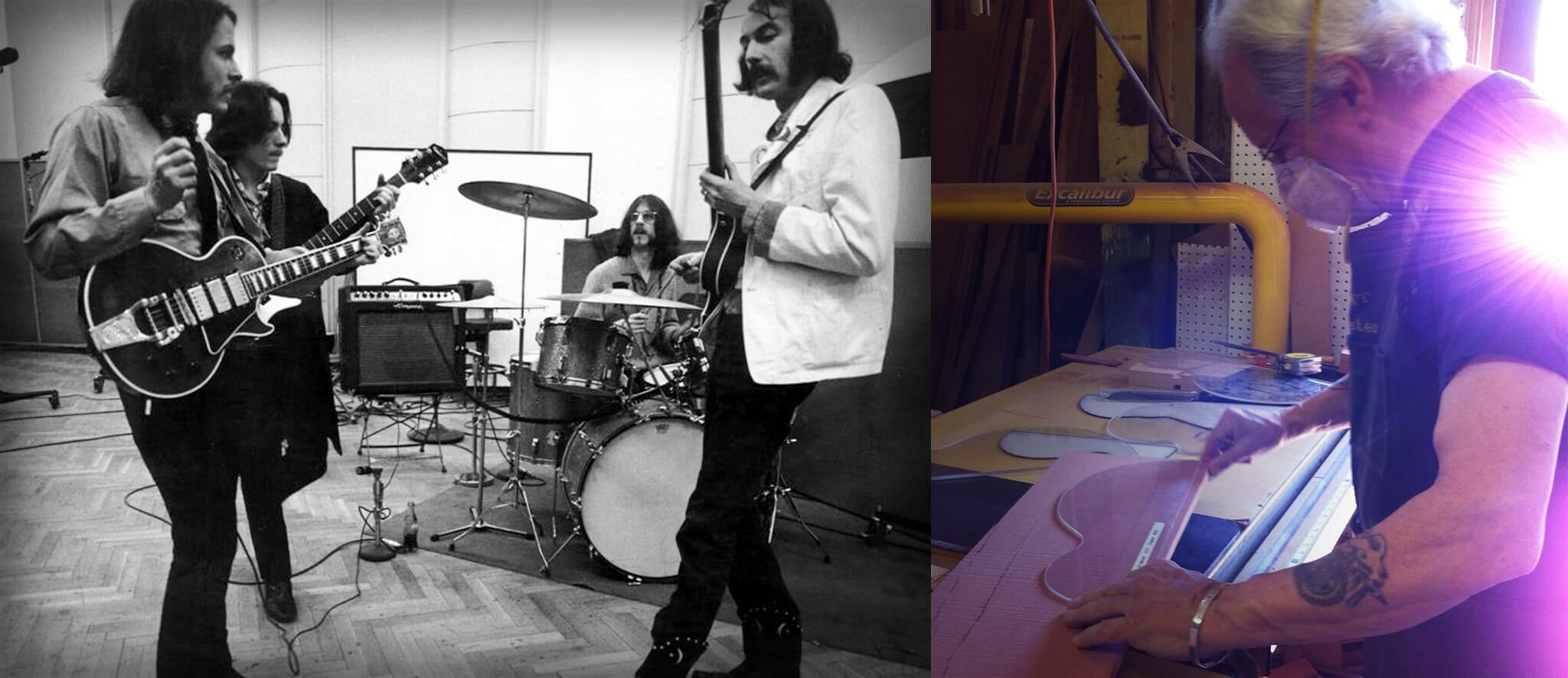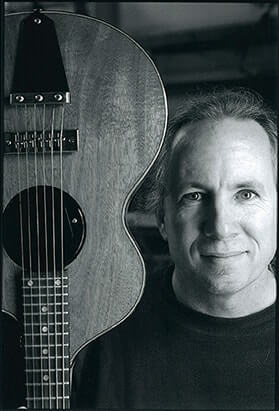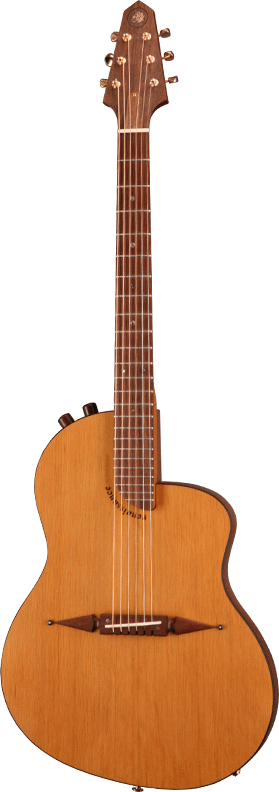
We Build Musical Tools
Innovation & Tradition. Sometimes that means capitalizing on the latest technology, sometimes it means refining details that have been there since the beginning. We have many modern advantages over the old masters; however, one of the most important often goes unspoken. We’ve been playing their designs for hundreds of years.
 Rick Turner started out as a music-lover and amateur East Coast musician, a self-described “espresso drinking, beret wearing, poetry reading, bongo playing” pre-hippie. He decided that the band wasn’t going anywhere and moved out west, where he started work building electric guitars. Six months after the move, Rolling Stone printed a rave review on his now-defunct band. Rick, however, was already on to bigger and better things: winding pickups by hand.
Rick Turner started out as a music-lover and amateur East Coast musician, a self-described “espresso drinking, beret wearing, poetry reading, bongo playing” pre-hippie. He decided that the band wasn’t going anywhere and moved out west, where he started work building electric guitars. Six months after the move, Rolling Stone printed a rave review on his now-defunct band. Rick, however, was already on to bigger and better things: winding pickups by hand.
He hand-wound the pickups simply because he couldn’t figure out where to buy them. Instead of winding 8,000 turns like the machines at Gibson or Fender were doing, he stopped at 1,000, or 1,500, or whenever his hand was cramping too badly to continue. Enter Ron Wickersham, with his passion for active electronics. Ron quickly realized that these low-impedance pickups Rick was producing captured a much wider frequency band then the pickups on existing commercial instruments. Coupled with a pre-amp to boost the signal back to the levels achieved by high-impedance pickups, the result was an amplified guitar or bass with a much richer, more natural tone. Alembic Inc was born.
Rick honed his craft over the years that followed, supplying instruments to a laundry list of top acts from the Grateful Dead to Jefferson Airplane to Crosby, Stills, Nash & Young. Alembic instruments have been spotted in the hands of Lamar Williams of The Allman Brothers Band, Tom Fowler of Frank Zappa and the Mothers of Invention, John Entwistle of The Who, and John Paul Jones of Led Zeppelin. He left Alembic to pursue the design of his very own Model One guitar, which employed a laminated neck design for increased sustain and stability, and a cylindrical arch to decrease the standing waves created by parallel surfaces. The Model One left Rick’s workshop and went straight into the hands of Fleetwood Mac’s Lindsey Buckingham. Lindsey has since retired his original Model One, but has three others that he still plays.

After a brief stint in Gibson’s research and development department (too corporate, Rick decided by 1991) he resumed his focus on building his own line of instruments, augmented now by the Electroline solid body bass, originally designed for Gibson but never put into production and so relinquished back into Rick’s control. The Electroline features Rick’s Universal String Pickup, a piezo crystal pickup that responds both to the vertical pressure exerted by strings and to their horizontal vibrations. By coupling the responses of these two crystal configurations, he was able to get a much more 3-dimensional signal from the original acoustic sound wave. Sometimes the amplified sound can even be too realistic, and a built-in filter becomes necessary to keep power-hungry subsonic frequencies from gobbling up all the current needed to drive the human-audible mid- and high-range tones.
Of course, Rick’s lineup wouldn’t be complete without the Renaissance series of semi-hollow guitars and basses. Expert luthier Jeff Traugott hit the nail on the head when he griped: “What is it with you Rick? Why do your guitars sound more acoustic than mine when mine is an acoustic guitar and yours isn’t?” Using technology that essentially amounts to a military submarine’s passive sonar array, Rick set out to produce a guitar that sounded more acoustic when amplified than any true acoustic ever could. Along the way, he also stumbled upon a couple of techniques that allowed him to slash labor costs dramatically and offer Renaissance hand-built masterfully-crafted guitars and basses at a price point one might expect for mass-produced instruments. But the quality is the only thing that matters, right?
 Quality is, of course, the top priority with all of Rick Turner’s instruments. This is perhaps most evident in his Compass Rose guitars and ukuleles, which eschew the electronic marvels he’s pioneered and focus on producing the warmest, richest old-world sound possible. He couldn’t resist innovating, though, which has led to a fingerboard assembly so strong that it can support the weight of a human and a tilting neck that the player can use to adjust the instrument’s action as easily as changing a string. Compass Rose guitars are rugged enough to hold their tone even in Antarctica (Henry Kaiser used the actual steel pole that marks the geographic South Pole as a slide for his Compass Rose in 2001) and built so that the sound projects out in front of the musician without any amplification.
Quality is, of course, the top priority with all of Rick Turner’s instruments. This is perhaps most evident in his Compass Rose guitars and ukuleles, which eschew the electronic marvels he’s pioneered and focus on producing the warmest, richest old-world sound possible. He couldn’t resist innovating, though, which has led to a fingerboard assembly so strong that it can support the weight of a human and a tilting neck that the player can use to adjust the instrument’s action as easily as changing a string. Compass Rose guitars are rugged enough to hold their tone even in Antarctica (Henry Kaiser used the actual steel pole that marks the geographic South Pole as a slide for his Compass Rose in 2001) and built so that the sound projects out in front of the musician without any amplification.
Rick Turner may not be hand-winding his own pickups anymore, but he certainly hasn’t stopped discovering ways to turn the music world on its head. His writing in American Lutherie, Guitar Player magazine and Acoustic Guitar serves to inspire young luthiers and remind the community of the importance of meticulous craftsmanship and top-quality materials. His instruments may not be for everybody, but any musician who needs a guitar, bass or ukulele that sounds “just so” may find that Rick Turner already has something to offer them.